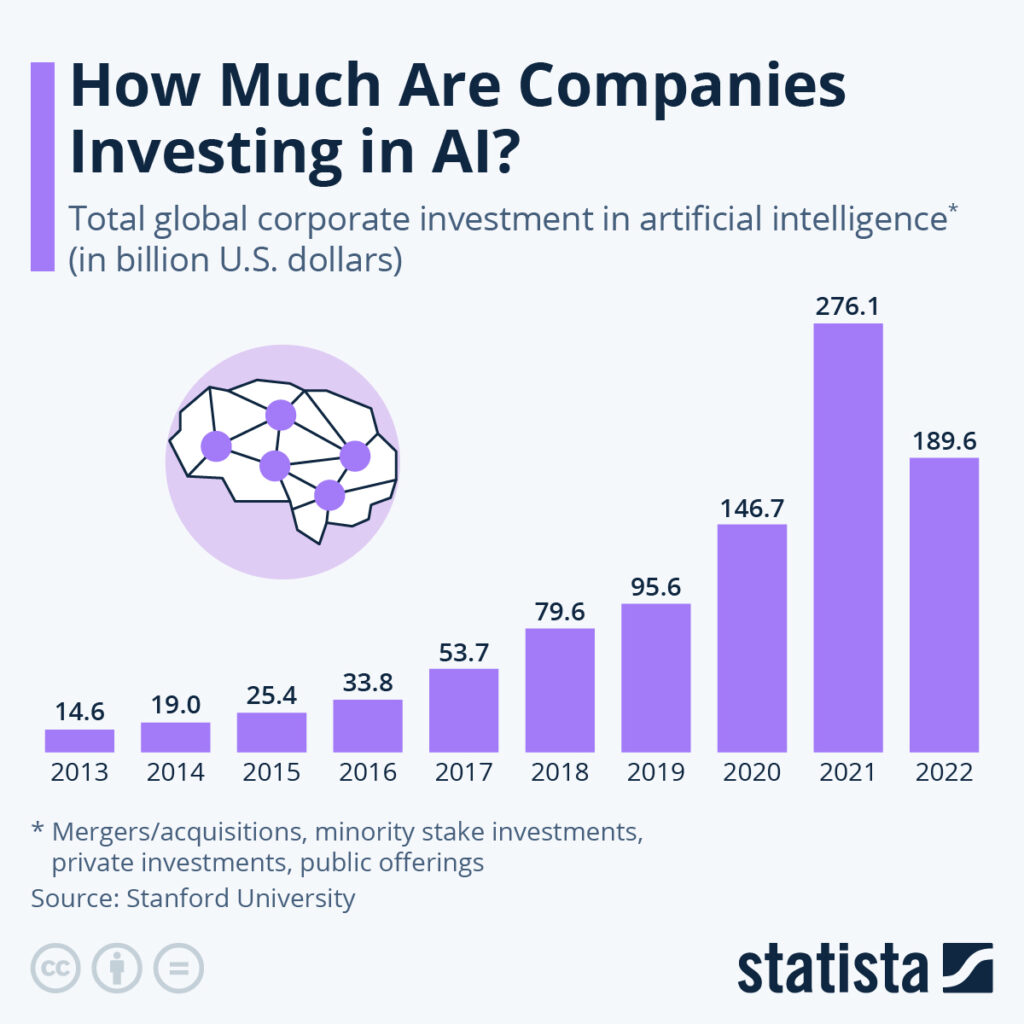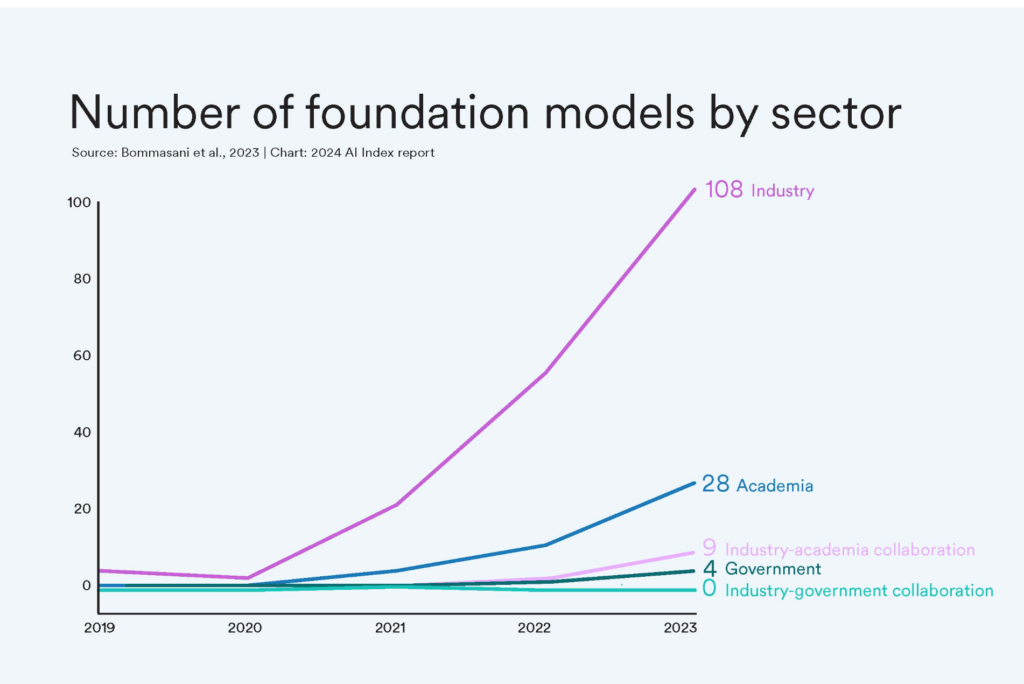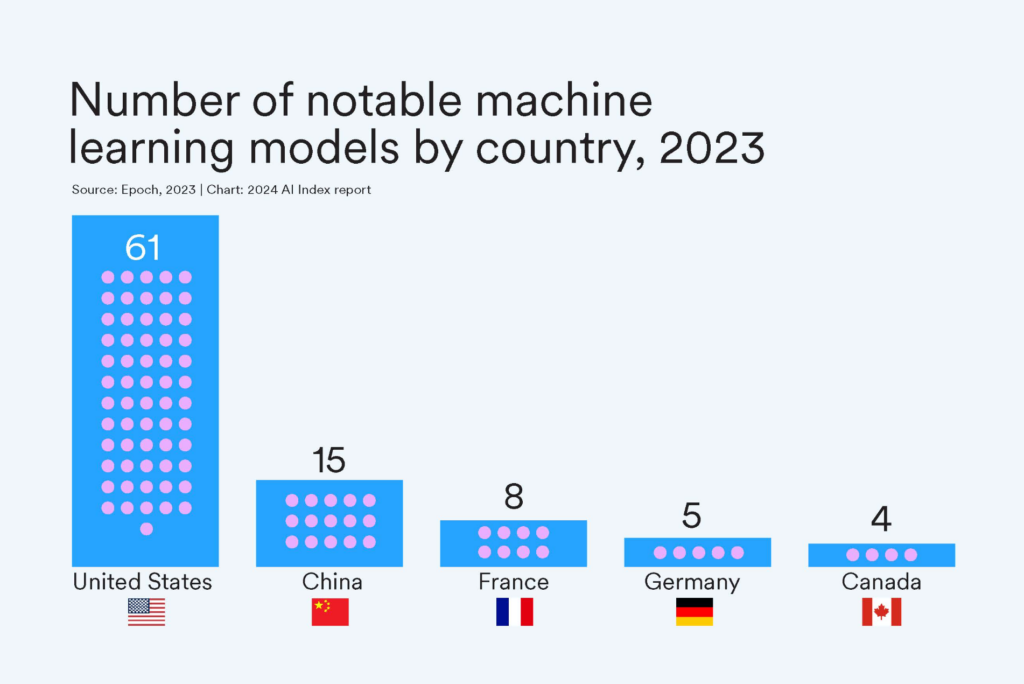Navigating the Future of AI in Business: Global AI Investment Trends
The artificial intelligence (AI) landscape is evolving at an unprecedented rate, transforming industries with its vast potential and dynamic capabilities. By 2024, global corporate AI investment trends is expected to surge to a staggering $110 billion, signaling a pivotal shift in how businesses operate and compete.

300% increase in AI-related publications over the last decade, underscoring the rapid pace adoption. This burgeoning growth indicates that nearly every organization will leverage AI to some extent within the next few years, setting the stage for a transformed business landscape that is smarter, more efficient, and infinitely more data-driven.
In this blog, we will delve into the specific ways AI is reshaping industries, spotlight key investment trends, and explore how businesses can harness this technology to catalyze growth and operational efficiency.
Global Future of AI Investment Trends: Who’s Leading and Where?
The landscape of AI investment is markedly dominated by industry giants, with technological advancements largely driven by corporate powerhouses rather than academia or government sectors. Google stands out, having released the most foundation models, such as Gemini and RT-2, totaling 40 since 2019, followed by OpenAI with 20 models. This significant output starkly contrasts with contributions from academic institutions like UC Berkeley and Stanford, highlighting the scale of corporate influence in AI development.

In terms of geographical influence, the United States continues to lead the AI race, developing a majority of notable machine learning models. In 2023 alone, the U.S. produced 61 models, far surpassing other nations, with China and the UK also contributing but at a much lower scale.

Financially, the cost of training AI models has skyrocketed, further cementing the dominance of well-funded corporations in the AI space. For instance, Google’s Gemini Ultra and OpenAI’s GPT-4 involved training costs estimated at $191 million and $78 million, respectively, a steep increase from the mere $900 required for earlier models like the Transformer in 2017.
Corporate AI Strategies: Driving Growth and Efficiency
As AI continues to revolutionize the business landscape, adopting strategic AI solutions has become crucial for companies aiming to enhance operational efficiency and drive growth. Leading corporations across various industries are harnessing AI to optimize processes, improve decision-making, and deliver exceptional customer experiences.
Here, we explore how businesses can craft effective AI strategies, underpinned by real-world examples from companies that have successfully integrated AI into their operations.
Strategic Framework for AI Adoption:
- Define Objectives: Clearly outline what the business aims to achieve with AI, from process optimization to customer satisfaction.
- Customize Solutions: Develop AI tools tailored to specific business needs to ensure relevance and effectiveness.
- Skills Investment: Prioritize building AI expertise through training and hiring to support sustained innovation.
- Pilot Testing: Implement AI projects on a small scale initially to gauge impact and refine approaches before wider rollout.
- Continuous Evaluation: Regularly assess AI initiatives and adjust strategies based on performance data and evolving business goals.
Let’s examine some practical examples of how leading corporations are harnessing AI to enhance their operations and deliver exceptional value. These case studies will illustrate the dynamic ways in which AI is being utilized to address specific business challenges, improve customer interactions, and drive significant growth.
Case Study: Starbucks’ AI-Driven Transformation
As the world’s leading coffee retailer, Starbucks faces the continuous challenge of enhancing customer experience and operational efficiency across its global network of over 30,000 stores. The company needed to orchestrate perfectly timed processes and maintain market leadership amidst rapidly changing conditions.
- AI Integration: Starbucks initiated its digital transformation long before mainstream AI adoption, culminating in the launch of Deep Brew in 2019. This AI-driven platform plays a crucial role in personalizing customer interactions, optimizing store labor, and managing inventory effectively.
- Personalized Recommendations: By leveraging customer data from their mobile app and in-store interactions, Deep Brew provides personalized beverage recommendations, enhancing the customer experience. This system adjusts suggestions based on factors like weather, time of day, and previous purchases.
- Operational Efficiency: Deep Brew also automates complex tasks such as inventory management and labor allocation. The AI predicts store traffic and staffing needs, helping managers optimize schedules and reduce operational costs.
Outcomes:
- Enhanced Customer Engagement: The AI integration allows Starbucks to offer a highly personalized experience, significantly boosting customer satisfaction and loyalty.
- Operational Improvements: Improved efficiency in inventory and labor management has led to cost savings and smoother store operations.
Starbucks continues to innovate with Deep Brew, enhancing drive-thru recommendations and streamlining in-store operations. They envision leveraging AI to improve business outcomes and to empower employees and enrich customer interactions.
Case Study: Aivin’s AI-Driven Innovation in the Wine Industry
Aivin sought to enhance the capabilities of sommeliers and wine professionals through advanced AI technology. Developed as a Generative AI assistant specifically tailored for the wine industry, Aivin revolutionizes how wine knowledge is delivered and utilized. Pyxl played a crucial role in integrating AI functionalities that enabled Aivin to provide comprehensive wine education, personalized guest recommendations, and efficient inventory management.
Key Features and Implementation:
- Personalized Recommendations and Education: Offering detailed insights and suggestions tailored to individual preferences, enhancing guest experiences.
- Innovative Food and Wine Pairings: Leveraging AI to suggest ideal wine pairings for diverse culinary dishes, adding value to dining experiences.
- Streamlined Event and Tasting Management: Simplifying the organization and execution of wine-related events, ensuring seamless operations.
With its successful market entry, Aivin is poised to continue its trajectory of innovation, further embedding AI technology in the wine industry to transform how professionals and enthusiasts interact with wine.
Key Takeaways
The strategic deployment of artificial intelligence is proving to be a significant catalyst for enhancing corporate valuation and operational agility. Investing in AI not only propels companies ahead in competitive markets but also offers remarkable returns through optimized processes and advanced customer engagement strategies. For any business looking to secure your place in the future, understanding and investing in AI technologies is essential.
Interested in how AI can elevate your business value? Visit our AI Solutions page to discover how our tailored AI strategies can transform your operations and drive substantial growth.
Updated: Apr 16, 2025
 Kati Terzinski
Kati Terzinski Erin Murray
Erin Murray